
Lee Francis Allen was an American tenor saxophone player. Phil Alvin, Allen's bandmate in The Blasters, called him one of the most important instrumentalists in rock'n'roll. Allen's distinctive tone has been hailed as "one of the defining sounds of rock'n'roll" and "one of the DNA strands of rock."

"Good Golly, Miss Molly" is a rock 'n' roll song first recorded in 1956 by American musician Little Richard and released in January 1958 as Specialty single 624, and later on Little Richard in July 1958. The song, a jump blues, was written by John Marascalco and producer Robert "Bumps" Blackwell. Although it was first recorded by Little Richard, Blackwell produced another version by the Valiants, who imitated the fast first version recorded by Little Richard, not released at that time. Although the Valiants' version was released first, Little Richard had the hit, reaching No. 4. Like all his early hits, it quickly became a rock 'n' roll standard and has subsequently been recorded by hundreds of artists. The song is ranked No. 92 on the Rolling Stone magazine's list of the 500 Greatest Songs of All Time.
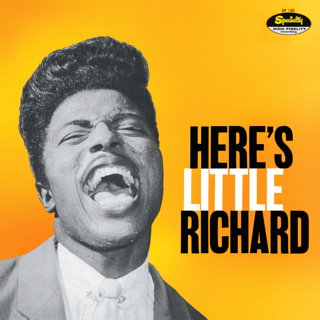
Here's Little Richard is the debut album by American musician Little Richard, released on March 4, 1957. Promoted as "six of Little Richard's hits and six brand new songs of hit calibre", the album compiles many of the A-sides and B-sides from Richard's hit singles including the Billboard top 40 entries "Tutti Frutti", "Long Tall Sally", "Slippin' and Slidin'", "Rip It Up" and "Jenny, Jenny" and the top 10 Rhythm and Blues Best-Sellers hits "Ready Teddy", "She's Got It" and "Miss Ann".

The song "Hey-Hey-Hey-Hey", also known as "Hey-Hey-Hey-Hey! ", was written by Little Richard and recorded on May 9, 1956 at J&M Studio, New Orleans, Louisiana,.
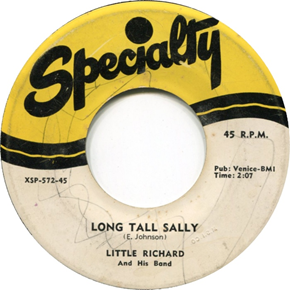
"Long Tall Sally", also known as "Long Tall Sally (The Thing)", is a rock and roll song written by Robert "Bumps" Blackwell, Enotris Johnson, and Little Richard. Richard recorded it for Specialty Records, which released it as a single in March 1956, backed with "Slippin' and Slidin'".

"Tutti Frutti" is a song written by Little Richard and Dorothy LaBostrie, recorded in 1955, which was his first major hit. With its energetic refrain, often transcribed as "A-wop-bop-a-loo-mop-a-lop-bam-boom!", and its hard-driving sound and wild lyrics, it became not only a model for many future Little Richard songs, but also for rock and roll itself. The song introduced several of rock music's most characteristic musical features, including its loud volume, powerful vocal style, and distinctive beat and rhythm.

"The Chipmunk Song (Christmas Don't Be Late)" is a novelty Christmas song written by Ross Bagdasarian (under the stage name of David Seville) in 1958. Bagdasarian sang and recorded the song, varying the tape speeds to produce high-pitched "chipmunk" voices, with the vocals credited to Alvin and the Chipmunks, Seville's cartoon virtual band. The song won three Grammy Awards in 1958, for Best Comedy Performance, Best Children's Recording, and Best Engineered Record (non-classical); it was also nominated for Record of the Year.

"Tell It Like It Is" is a song written by George Davis and Lee Diamond and originally recorded and released in 1966 by Aaron Neville. In 2010, the song was ranked No. 391 on Rolling Stone magazine's list of The 500 Greatest Songs of All Time.

"Lucille" is a 1957 rock and roll song originally recorded by American musician Little Richard. Released on Specialty Records in February 1957, the single reached number 1 on the Billboard R&B chart, 21 on the US pop chart, and number 10 on the UK chart. It was composed by Albert Collins and Little Richard. First pressings of Specialty 78rpm credit Collins as the sole writer. Little Richard bought half of the song's rights while Collins was in Louisiana State Penitentiary.

Alvin Owen "Red" Tyler was an American R&B and neo-bop jazz saxophonist, composer and arranger, regarded as "one of the most important figures in New Orleans R&B".
"Slippin' and Slidin' (Peepin' and Hidin')" is an R&B/rock 'n' roll song performed by Little Richard. The song is credited to Little Richard, Edwin Bocage (Eddie Bo), Al Collins, and James Smith.

The Second Coming was Little Richard's third album for Reprise Records, released in 1972. The album saw him reunited with Robert "Bumps" Blackwell from his Specialty days, with them co-writing the majority of the album together. The concept was to unite the best rock studio musicians of the '50s with the best rock studio musicians of the '70s. The album failed to chart.

Southern Child is an album by Little Richard, scheduled to be released in 1972 as his third album for Reprise Records. It was going to be Reprise RS 2097. For unconfirmed reasons the album was shelved in favour of The Second Coming, released in October. The tracks comprising the album were released in 2005 from Rhino Records as part of their Complete Reprise Recordings collection. A stand-alone version was released in December 2020.

Little Richard Live! 20 Super Hits is a recording of a live-in-studio performance by Little Richard. Recorded at the Jack Clement Studio in Nashville before an audience, the album featured remakes of twenty of his Specialty Records tracks. Counting the live takes on this album, this was the second time that Richard had rerecorded his 1950s hits in studio. These August 1976 sessions and an early 1990s session with Japanese guitarist Masayoshi Takanakka are the last times that Penniman would re-record his 1950s hits for an album before his death in May 2020. Alternate takes from these sessions are found on a full stereo "Audiophile" album from 1980.
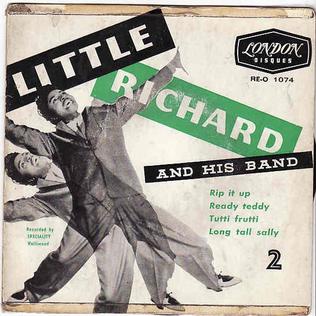
"Rip It Up" is a rock and roll song written by Robert Blackwell and John Marascalco. In June 1956, Specialty Records released it as a single by Little Richard with "Ready Teddy" as the B-side. The song reached the top position on the Billboard Rhythm & Blues Records chart as well as number 17 on the magazine's broader Billboard Hot 100. The version peaked at number 30 in the UK Singles Chart. The song was also recorded by Elvis Presley in 1956.
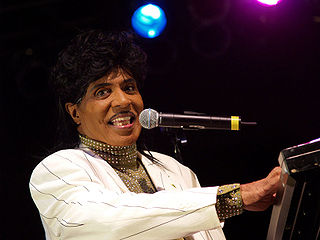
This page is a discography for American musician Little Richard (1932–2020). Described as "the architect of rock and roll", Little Richard was a pioneering singer-songwriter whose career also encompassed rhythm and blues, soul, and gospel. He began his recording career in 1951, signing to RCA Victor, releasing his first singles, and his first album in 1957, although he released his last album in 1992, he continued to tour into the 21st century. He attained international success after signing with Specialty Records in 1955.
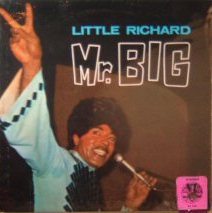
Mr. Big, released in the middle of his Reprise Records period, was another compilation of Little Richard's mid-1960s recordings for Vee Jay Records, released on the UK Joy label. None of the tracks had previously been released on an album - many had been released on singles in 1965, the rest were previously unreleased. A later album with not only the same name, but also the same cover was released for the US market in 1974 with different tracks. . Another similar release came in the form of Talkin‘ ‘bout Soul, also in 1974, with one previously unreleased track and stereo versions of released single sides.

The Fabulous Little Richard was the third album from Little Richard, and the end of his rock and roll period. Released seventeen months after he had left the Specialty Records label, Richard had returned to religion and turned his back on the music that made him famous. Though he would briefly rescind that decision in 1962, and sporadically throughout his career, this album marked the end of his peak period. In order to make the record more accessible to listeners, over half of the tracks featured an overdubbed female backing group. The record was put together including out-takes and other leftover studio tracks, which saw Richard in a somewhat more mellow styling.
"Keep A-Knockin' " is a popular song that has been recorded by a variety of musicians over the years. The lyrics concern a lover at the door who will not be admitted; some versions because someone else is already there, but in most others because the knocking lover has behaved badly.
"Send Me Some Lovin'" is a 1957 rock and roll standard recorded by Little Richard. John S. Marascalso co-wrote "Send Me Some Lovin'" with Leo Price.















